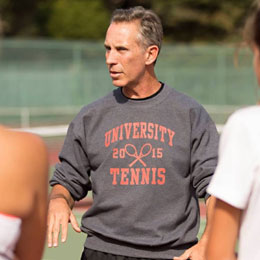Player Advice
What Can You Control?
by Damon Valentino, 21 December 2015
Special from
FlowSport
| Share: |  |
|  | |
|
|
As junior tennis players looking to play at the collegiate level, you have already taken your game to a pretty high level. You probably know that to be the best player you can be, you need to work hard on and off the court. You realize that fitness and diet is important, and if you've taken your training even further, you probably have a list of goals that you are working towards. Let me take a crack at what might be on your list: 1. Getting my ranking in the top 50. 2. Winning two tournaments this season. 3. Beating my rival. 4. Making Nationals.

Was I close? At first glance, these all seem like perfectly fine goals. But I want to ask you one simple question. Do you really have control over these goals? Think about it. You could play your best tennis and still not crack the top 50. You could be in the zone for every tournament of the season and not win them. Your rival might just have a better day when you play. And finally, you could have a tough draw that keeps you from making Nationals. If this is true, you are going to look back at your goals and feel like a failure. This will not only sap your momentum, but it could also damage your confidence as well.
So instead of setting goals that are outside of your control, how about picking three things that are 100% in your control and making those your focus? Here are some examples that mentally tough players use:
1. Perfect my routines. (Pre-serve, change over, between point, mistake.) Not only can you have 100% control over your routines, but research shows that players who spend less time thinking about what just happened or what's going to happen next, play up to their potential "in the moment". This can make all the difference when it's 5-all in the third set.
2. Focus on my tactics. (Hit the ball early, go crosscourt with my groundstrokes, pick a target before serving, attack short balls.) Research also shows that players who focus on "action based" thoughts maintain more consistency, even when the pressure is greatest. Not only that, but focusing on what you can control keeps you relaxed and allows you to continue going for your shots.
3. Mind my thoughts. If I asked you take take a pen and paper and gave you one minute to write down everything the popped into your mind, you would fill the page! Do you need to give your attention to each one of these thoughts? Of course not. So why do we let these random thoughts get in the way when we compete? Once you accept the fact that you will have all sorts of thoughts (positive, negative, dreamy, silly, ridiculous) you can pick and choose the thoughts that actually have value for you on the court. You aren't trying to get rid of thoughts, but rather, just select the ones that keep you focused on your goals. Research has shown that if you focus on thoughts that are productive and label those that are not, you have the best chance to produce your best performance.
When you focus on what you can control, you give yourself a chance to play your best tennis. When you play your best tennis, you give yourself the best chance to achieve the outcomes that: 1. Improve your ranking. 2. Win tourneys. 3. Beat your rival. 4. Make Nationals.
Leave a Comment
More Player Advice
12-Jun-2024
How to Prepare for the Transition to College Tennis
Summer is here and many players will be making the transition from their junior tennis careers to starting anew in college tennis. To help with the transition, a number of current college players offered advice on successful strategies to prepare for the experience.
29-Mar-2024
College Recruiting Videos: Yes, No or Maybe?
Former college coach Danielle Lund McNamara is now providing guidance on how to navigate the recruiting process and advice on transitioning to college. In her most recent entry for TRN, she provides tips on using videos to help attract interest from programs.
11-Feb-2024
Djokovic's Mental Strength: Talent or Training?
Can Novak Djokovic’s approach to mental fitness be appplied to junior tennis? Medical scientist Leon Box explores that issue in depth to try and help juniors improve their overall games.
About Damon Valentino
Damon Valentino is the Director of
Sidestreet Performance Coaching
in the SF Bay Area. He holds a Master's Degree in Sport Psychology and
was a former Division I full scholarship tennis player at Michigan
State University. Damon works with competitive juniors as well as
collegiate tennis players across the country.
To set up a free 20 minute strategy session with him in person or
on skype, go to his website at
SideStreetCoaching.com
- or connect with him on
Facebook
and
Twitter.